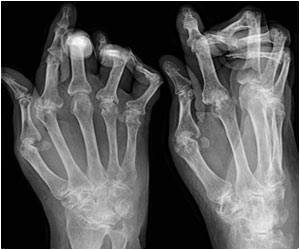A new inflammatory stress mechanism and specific inhibitor for the treatment of rheumatoid arthritis have been identified by researchers.

Their work identified a specific IRE1a inhibitor that can efficiently prevent arthritis in animal models.
The study, "Toll-like receptor-mediated IRE1a activation as a therapeutic target for inflammatory arthritis," was published in the prestigious scientific journal EMBO. Zhang served as a corresponding author. The study can be read at http://www.nature.com/emboj/journal/v32/n18/full/emboj2013183a.html.
"This is a notable work in the understanding of the stress mechanism for the development of rheumatoid arthritis," Zhang said. "For the first time, we revealed the molecular targets of Unfolded Protein Response and Toll-like Receptor signaling and their interaction mechanism in the progression of inflammatory arthritis. Our study not only identified previously unknown molecular targets, but also pointed out a specific inhibitor that can efficiently suppress arthritis."
Dr. Zhang said the next step toward the development of therapeutics may be testing the effects of specific inhibitors of Unfolded Protein Response in curing inflammatory arthritis with animal models and clinical trials.
Rheumatoid arthritis is an autoimmune disease that causes a chronic, systemic inflammatory disorder that can affect many tissues and organs, but principally flexible joints. Rheumatoid arthritis is one of the most common rheumatic diseases, affecting approximately 1.3 million people in the United States. The disease is three times more common in women than in men and afflicts people of all races. The disease can begin at any age, but it often occurs in adults between the ages of 40 and 60. The cause is unknown.
Advertisement
Source-Eurekalert















